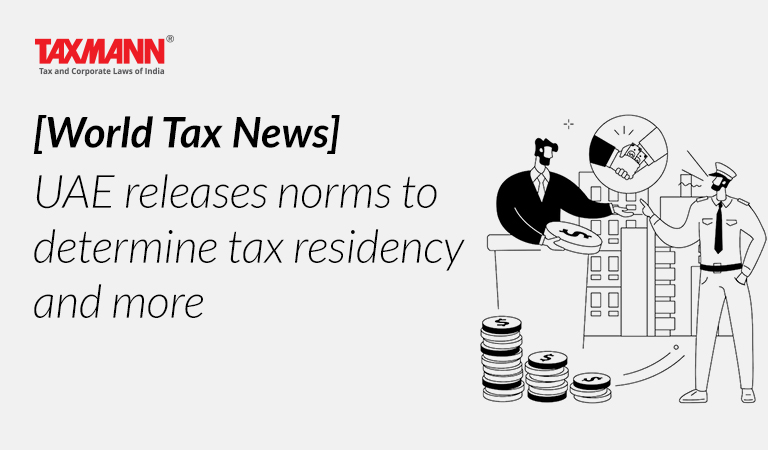[World Tax News] UAE releases norms to determine tax residency and more
- Blog|News|International Tax|
- 3 Min Read
- By Taxmann
- |
- Last Updated on 19 November, 2022

Editorial Team – [2022] 145 taxmann.com 47 (Article)
World Tax News provides a weekly snippet of tax news from around the globe. Here is a glimpse of the tax happening in the world this week.
1. UAE releases norms to determine tax residency
The Federal Tax Authority of the United Arab Emirates (UAE) has released Cabinet Resolution No. (85) of 2022, stating the conditions for determining tax residency in the UAE. Earlier, there were no specific provisions for determining the residential status of natural and legal persons. The resolution is said to be effective from 1st March 2023.
(a) Juridical Person
A juridical person (entity or establishment) shall be considered a Tax Resident in the UAE if any of the following conditions are satisfied:
- It was incorporated, formed, or recognized as per UAE laws. However, it does not include a branch registered in UAE by a foreign juridical person.
- It is considered a Tax Resident in accordance with the Income-tax Law in force in the UAE.
(b) Natural Person
A natural person (individual) shall be considered a Tax Resident in the UAE if any of the following conditions are satisfied:
- His primary principal place of residence and the centre of financial and personal interests are in UAE, or he meets the conditions and criteria as specified by the minister;
- He has been physically present in the UAE for 183 days or more in the relevant 12 months period; or
- He has been physically present in the UAE for 90 days or more in the relevant 12 months period, and he is a UAE National and holding a valid Residence Permit or holding the nationality of any member state of the Gulf Cooperation Council and
– He has a Permanent Place of Residence in the State; or
– He carries on employment or business in the State.
A person who is considered a Tax Resident in the UAE in accordance with the above norms may make an application to the authority to issue a Tax Residency Certificate (TRC).
Source: Cabinet Resolution No. (85) of 2022 English Version (translated)
2. Kazakhstan clarifies changes in dividend taxation effective from 01-01-2023
On 11th July 2022, the Parliament of Kazakhstan approved the law on Amendments and Additions to the Code of the Republic of Kazakhstan, “On Taxes and Other Obligatory Payments to the Budget” (hereafter called ‘Tax Code’).
The Tax Code brought changes with regard to the taxation of dividend income effective from 01st January 2023. The State Revenue Committee has released guidelines to clarify what changes will be made to the taxation of dividends. The Committee has issued the following clarifications:
(a) Resident individual
It has been clarified that the tax on the dividends received by a resident individual will be deducted at the rate of 10% instead of 5%. However, the exemption is provided for dividends received on listed shares actively traded on Kazakhstan Stock Exchanges (KASE, AIFC). Also, an overall exemption is provided on dividend income up to 30,000 Monthly Calculated Index (MCI).
MCI is an index used in Kazakhstan for calculating pensions, allowances, and other social payments, incrementing fines and calculating taxes and other payments. It is set annually by the law of the Republic on the Budget.
(b) Resident Companies
For resident companies, the general exemption is withdrawn. However, an exemption would be available if the dividends are paid on the securities actively traded on the Kazakhstan Stock Exchanges.
(c) Non-Residents
Dividends received by non-residents will be taxed at the rate of 10% as the exemption provided to them earlier is withdrawn. Non-residents are also eligible for exemption in respect of dividends paid on listed shares actively traded on Kazakhstan Stock Exchanges.
Source: Release by State Revenue Committee, Kazakhstan
Click Here To Read The Full Article
Disclaimer: The content/information published on the website is only for general information of the user and shall not be construed as legal advice. While the Taxmann has exercised reasonable efforts to ensure the veracity of information/content published, Taxmann shall be under no liability in any manner whatsoever for incorrect information, if any.

Taxmann Publications has a dedicated in-house Research & Editorial Team. This team consists of a team of Chartered Accountants, Company Secretaries, and Lawyers. This team works under the guidance and supervision of editor-in-chief Mr Rakesh Bhargava.
The Research and Editorial Team is responsible for developing reliable and accurate content for the readers. The team follows the six-sigma approach to achieve the benchmark of zero error in its publications and research platforms. The team ensures that the following publication guidelines are thoroughly followed while developing the content:
- The statutory material is obtained only from the authorized and reliable sources
- All the latest developments in the judicial and legislative fields are covered
- Prepare the analytical write-ups on current, controversial, and important issues to help the readers to understand the concept and its implications
- Every content published by Taxmann is complete, accurate and lucid
- All evidence-based statements are supported with proper reference to Section, Circular No., Notification No. or citations
- The golden rules of grammar, style and consistency are thoroughly followed
- Font and size that’s easy to read and remain consistent across all imprint and digital publications are applied



 CA | CS | CMA
CA | CS | CMA
